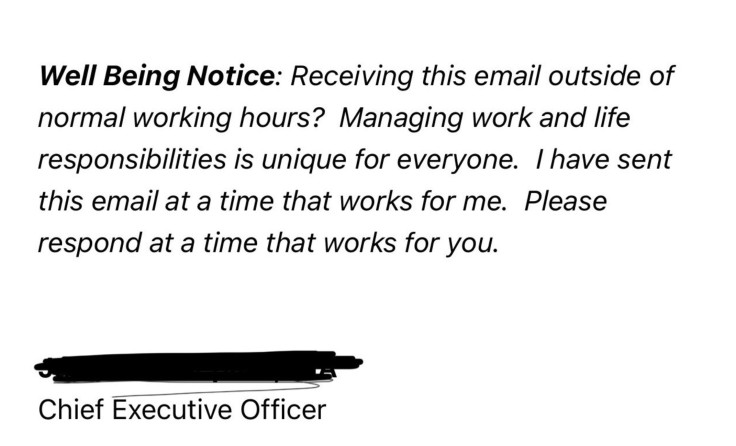'Respond At A Time That Works For You': This CEO's Disclaimer On Email to Employee Is Going Viral
More than 60% of remote workers check their work email during weekends

Steve, known as @IGoBySteve on X (formerly Twitter), went viral after sharing his new boss' email disclaimer on social media. Captioning a screenshot posted on X, Steve wrote, "Just got an after-hours email from my new CEO and noticed he added this little disclaimer. You love to see it."
The image showed that the CEO had altered their email signature to read: "Well-Being Notice: Receiving this email outside of normal working hours? Managing work and life responsibilities is unique for everyone. I have sent this email at a time that works for me. Please respond at a time that works for you."
The post elicited a variety of reactions. Some social media users argued that the CEO should have contacted their colleagues during office hours. However, others noted that the CEO values a work-life balance.
One user, @DC Stone, wrote: "I'm a manager that works with a team who pulls in unusual hours. I absolutely love this and will be using it going forward. Total green flag."
"This is way better than 'schedule send' because it acknowledges that others may have work hours different from yours," added another user, @Philosophie. Another user, @Ruby Baker Designs, said, "I will be adding this to my signature immediately. Love it!"
Conversely, some comments criticised the CEO for sending an after-hours email. "Or leave your employees alone during off-hours. Schedule your email delivery times in Outlook. It takes seconds," wrote @It's Me Mario.
Another user, @Ashley Kay Lawrence, advised, "My work hours can be late in the evening or on weekends. In those cases, I schedule emails to be sent during business hours."
A different account, @Jenny Hutson100, questioned, "Why didn't he just schedule it for a different time?"

According to a survey by Buffer, a social media maintenance platform for small businesses, 71% of remote workers think it's important to set work boundaries. Despite this, 63% of remote workers admitted to checking their work email during weekends, and 34% checked work emails while on holiday.
Research conducted in 2020 further shows that the COVID-19 pandemic has blurred the lines between work and personal life. A survey by the international human resource consulting firm Robert Half polled 2,800 employees and found that nearly 70 per cent of remote workers were clocking into work on weekends. The study, conducted during lockdown, also suggested that CEOs were sending and receiving even more work emails.
"While remote work affords employees greater flexibility, it also makes disconnecting extremely difficult," said Paul McDonald, senior executive director at Robert Half. "Many people feel pressure to keep up with rising workloads and are putting in long hours to support business and customer needs."
Studies have shown that after-hours emails create a sense that messages from work could arrive at any time, day or night, leading to higher levels of worry, poorer sleep quality, and lower relationship satisfaction. This phenomenon, dubbed "anticipatory stress" by Virginia Tech researcher William Becker, describes the state of constantly expecting to receive a work email after hours, even if one never comes.
Surprisingly, Becker's research revealed that the detrimental health consequences resulting from an employee's inability to take time away from work also affected the romantic partners of the workers.
Renee Zung, the vice president of career services at career management company Keystone Partners, advises managers to monitor the number of hours their staff members are working, prioritise encouraging time off, and help employees balance their workloads to prevent health problems among their workforce.
"Having a weekly meeting to prioritise workloads, reassign projects, or move project end-dates will create a better work environment and a culture that encourages employees to power down nightly and during the weekend. Line managers need to model 'checking out' behaviours so their employees believe it is acceptable to do the same," Zung said.
Cali Williams Yost, the founder of the consultancy Flex+Strategy Group and a nationally recognised pioneer in workplace flexibility, added that HR and line managers should also have regular discussions about work/life boundaries.
"Set clear priorities so employees can plan their lives around them," Yost said. "Clarify expectations for accessibility and responsiveness, such as during what hours emails or instant messages should be reviewed and responded to, or when it is best to call or text."
By adopting these practices, companies can help foster a healthier work environment where employees feel empowered to manage their work and personal responsibilities without feeling overwhelmed.
© Copyright IBTimes 2025. All rights reserved.






















